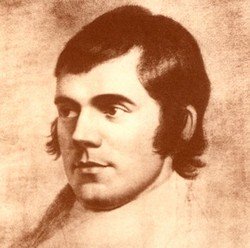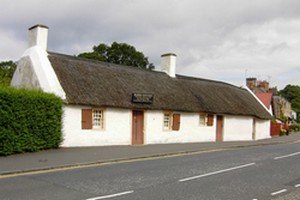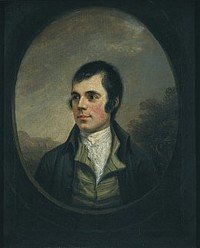|
Scotland's Poet of the People - Robert Burns
Robert Burns, the Scottish Bard, and Scotland's Poet of the People, was an astute observer of human nature, a humanist, poet, songwriter and remains a romantic cornerstone of Scottish culture. It is impossible to grow up in Scotland, or attend a Scottish school, without reading some of Robert Burns' wonderful and varied writings, and everyone who has read his poetry has their own personal favourite. back to Castles accommodation page..
Robert Burns' poetry has found its way into our language and culture, perhaps without our noticing, and there are few people in the English, or the Scots' speaking world for that matter, who haven't heard the famous song, sung every New Year, the world over.... 
Should auld acquaintance be forgot, (see bottom of page for complete poem) Or perhaps you've heard it said that "The best laid plans of mice and men..gang aft a'gley" (see bottom of page for complete poem) or his plainly stated views on human vanity... "A Man's a man for a that" Is there for honest Poverty (see bottom of page for complete poem) His thoughts on destroying a field mouse's nest with his plough are so profound they could have been written by an environmentalist of the 21st century.. "I'm truly sorry man's dominion and his hopes for social harmony are so eloquently expressed, how can one not share them? "For a' that, an' a' that, The day of Robert Burns' birth, 25th January, 1759 which was originally a gathering of a few of his friends to mourn his passing, is now remembered throughout the world as Burns Night, or a Burns' supper, where the haggis ("the chieftain' o' the puddin' race", yes he wrote a poem about a haggis too!) is eaten, whisky is drunk and his poems are read and savoured along with the food and the company. Robert Burns was more than a poet, he was a man of the people, and his powerful and meaningful commentary on the human condition have assured his place in the hearts and culture of Scotland for posterity. 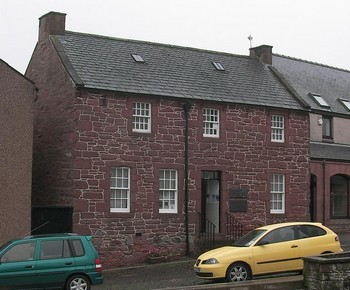
Burns flaw, and we all have them, is that he found it difficult to be faithful, but arrogant he most certainly was not. He hated hypocrisy, pomposity and pretentiousness, and when you read his poetry you discover his most prized virtues .. honesty, fairness, simplicity, kindness and hard work. Born on 25th January, 1759 in Alloway (in south Ayrshire), as one of seven children, Robert Burns lived in a house built by his father, whose name was not Burns, but Burness, and received most of his education from this remarkable man. Burn's father, who wrote for his children a Christian manual entitled "A Manual Of Christian Belief", disapproved of the young Robert's interest in joining a country dancing school along with his brother Gilbert, as frivolity was not part of his world-view. Robert took to full time farm labouring at a young age, and it seems from then on his life was on a predictable course, but Burns was neither a predictable, nor ordinary man. Interestingly enough, at the age of 22, Burns became a Freemason and he was to be involved with Freemasonry for the rest of his life. An early attempt at learning the art of flax dressing - (preparing flax to make linens, fishing nets and so on), was cut short when the shop where he was an apprentice was burned down, and he returned home to his father's farm. After the death of Burns' father, he and Gilbert tried in vain to keep up the farm, but it was not to be, and they eventually moved to a farm called Mossgiel, near Mauchline, where he met his future wife, Jean Armour, (with whom he would have nine children), when she shooed him away from her laundry which was drying outside on a clothes' line. 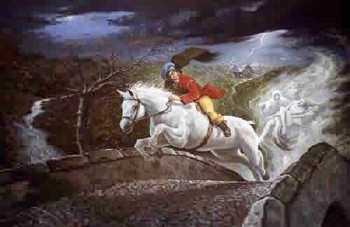
Never able to be faithful for long however, Robert Burns later embarked on a relationship with a girl called Mary Campbell, and planned to move with her to Jamaica where he hoped to find a position as a bookkeeper on a plantation, but Mary died of a fever before those plans could come to fruition. Encouraged by his brother Gilbert, that same year he published "Poems, Chiefly in the Scottish Dialect" which launched his career. His name and his fame were to follow, and he was invited to the capital city of Edinburgh, where he mingled in aristocratic society and was received with much praise. "His person was strong and robust; his manners rustic, not clownish, a sort of dignified plainness and simplicity which received part of its effect perhaps from knowledge of his extraordinary talents. His features are presented in Mr Nasmyth's picture but to me it conveys the idea that they are diminished, as if seen in perspective. I think his countenance was more massive than it looks in any of the portraits ... there was a strong expression of shrewdness in all his lineaments; the eye alone, I think, indicated the poetical character and temperament. It was large, and of a dark cast, and literally glowed when he spoke with feeling or interest. I never saw such another eye in a human head, though I have seen the most distinguished men of my time". 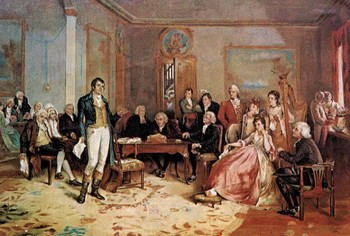
In spite of all the acclaim, Robert Burns never lost his humility and remained a man of the people without airs or affectations. He eventually returned to Jean and took a lease on a farm near Dumfries. No doubt wary of previous farming failures, he also trained as an Exciseman working for Customs and Excise, to support his large family. 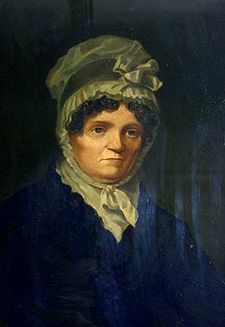
Burn's wife of many years, Jean Armour
Robert Burns wrote powerfully about many eternally important human issues.. the environment and our unfortunate relationship with nature, religion, the church and its abominable hypocrisy, the devotion of deep and true love, and about patriotism and love for his native country, Scotland. He also wrote about the evils and foolishness of over-indulgence in alcohol, and the alcoholic and religious delusions intermingled with all that follows addiction and dependency. Burns was also politically-minded and sympathetic to the cause of Scottish Nationalism, long before it was called such. "Scots Wha Hae", his famous and inspiring poem of the Scots' battle for freedom and liberty from the English, which could have landed him in jail for its revolutionary overtones, was submitted to the paper with the plea that the editors deny any knowledge of its author. It is still sung in the Scottish parliament as the unofficial Scottish National anthem, a song of freedom, courage and love for his homeland of Scotland. He commented on every aspect of life in his beautiful and lyrical Scots' dialect and many of his poems are still sung as well as read today, including of course "Auld Lang Syne" and "My Love is Like a Red, Red Rose". You can visit the home in which he grew up, which is now a museum and the house where he spent his last days. Statues have been erected to Burns, not only in Ayr, but also in many other cities throughout the world, where Scots now live. Below is the statue in Canberra, Australia, where many Scots emigrated following the Clearances and political upheavals of the 17th and 18th centuries. Whenever Scots gather on Burns' Night to reminisce and celebrate their unique culture and one anothers' company, they also celebrate the life and poetry of the man who unites them in their common love for their native country, Scotland, and thereby preserve not only the immortality of Robert Burns - a true poet of the Scottish people - but the fabric of Scottish culture itself. 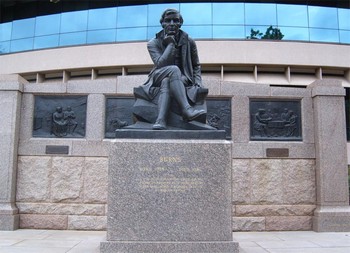
Below is a map showing location of Burn's Cottage in Ayrshire... 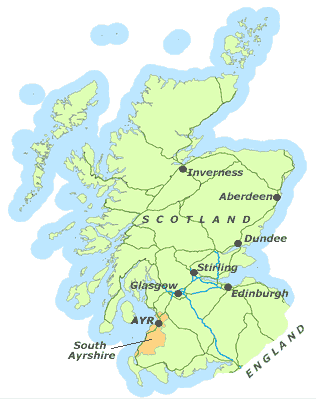
On Turning her up in her Nest with the Plough Wee, sleekit, cow'rin', tim'rous beastie, I'm truly sorry man's dominion I doubt na, whiles, but thou may thieve; Thy wee bit housie, too, in ruin! Thou saw the fields laid bare and waste That wee bit heap o' leaves an' stibble But, Mousie, thou art no thy lane Still thou art blest, compared wi' me!
Should auld acquaintance be forgot, And surely ye’ll be your pint stowp, We twa hae run about the braes, We twa hae paidl'd in the burn, And there's a hand, my trusty fiere! A Man's a Man for a' That Is there for honest Poverty What though on hamely fare we dine, Ye see yon birkie, ca'd a lord, A prince can mak a belted knight, Then let us pray that come it may, My Love is Like a Red Red Rose O, my luve's like a red, red rose, As fair art thou, my bonie lass, Till a' the seas gang dry, my Dear, And fare thee weel, my only Luve, Scots Wha' Hae' Scots, wha hae wi' Wallace bled, 'Now's the day, and now's the hour: 'Wha will be a traitor knave? 'Wha, for Scotland's king and law, 'By Oppression's woes and pains! 'Lay the proud usurpers low!
|
